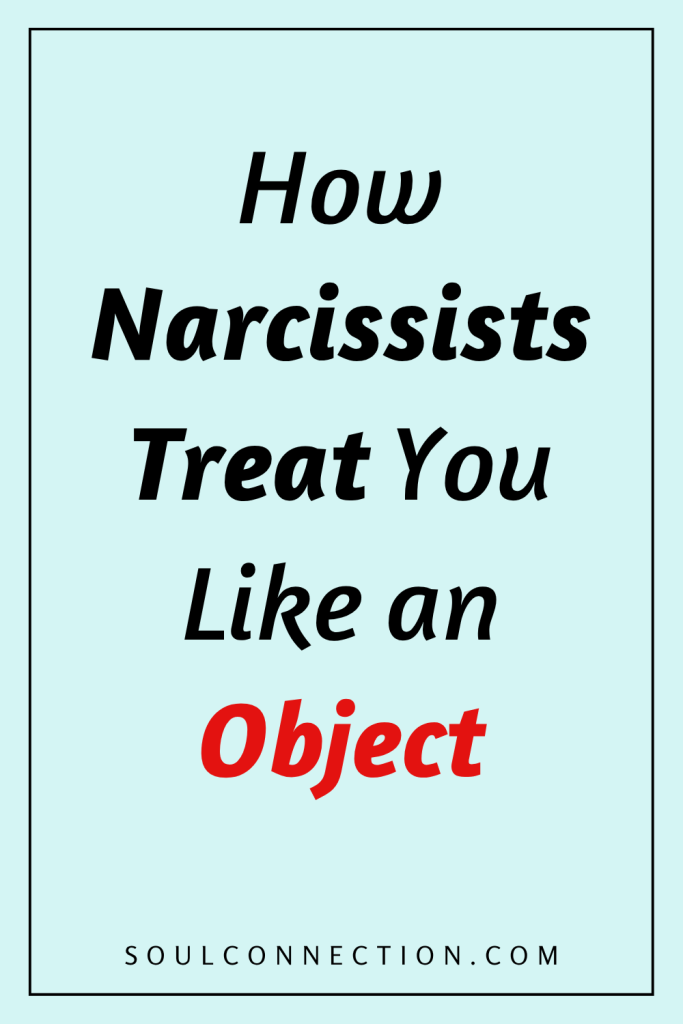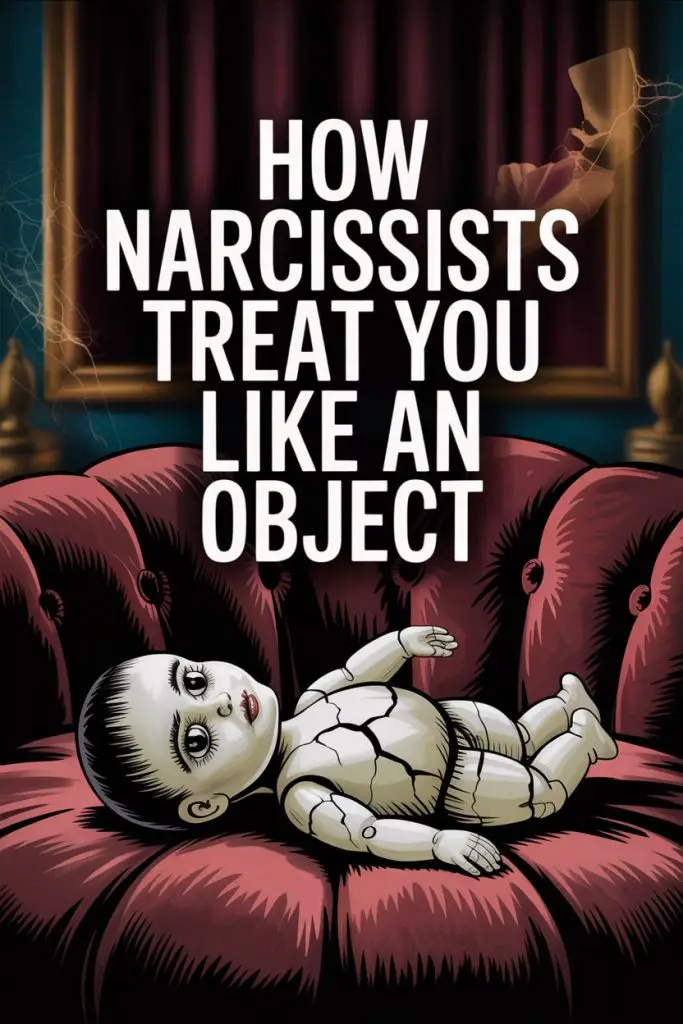Ever felt like someone views you as a walking vending machine—press a button, get a snack, then shoved aside until the next craving?
Welcome to the not-so-glamorous world of being objectified by a narcissist. It’s not just about ego; it’s about becoming a prop in someone else’s one-man show.
Let’s unpack the telltale signs, what it does to your sense of self, and how to keep your dignity intact when you realize you’re being treated more like a toaster than a person.
What Objectification Looks Like With a Narcissist
Being in a relationship with a narcissist has a particular flavor. Imagine being at a dinner party where you’re expected to look lovely, say the “right” things, and never spill the gravy.
That’s not affection—it’s choreography.
For a narcissist, partners, friends, and even their own kids aren’t seen as complex beings with ideas and needs. Instead, everyone gets sorted into one of two bins: useful or useless.
Useful people boost the narcissist’s self-esteem, attend to their desires, and—crucially—don’t ask too much in return.
Ever feel like someone only calls when they need a ride to the airport, or compliments you just before hitting you up for a favor? That’s your first clue.
In the narcissist’s eyes, your value is measured by what you provide, not who you are.
The Human Mirror
One of the narcissist’s favorite tricks is turning you into a mirror. Your job? Reflect their greatness back at them, 24/7.
Notice how they love to show you off at parties, but as soon as the crowd thins, you’re suddenly invisible? When your main role in someone’s life is to make them look good, you’re not in a relationship—you’re an accessory.
This “human mirror” dynamic leaves you feeling drained and unseen.
Your accomplishments? Claimed as evidence of their own excellence. Your struggles? Either ignored, minimized, or used as a stage for their own “heroic” rescue attempts…as long as there’s an audience.
Emotional Vending Machine Syndrome
Ever been guilt-tripped for not responding to texts quickly enough, or ignored for days after expressing a need? Narcissists expect emotional service on demand, like pressing the “Diet Coke” button and waiting for the fizz.
If you’re not cheerful, supportive, and available at all hours, the narcissist might sulk, rage, or act as if you’ve committed an unforgivable betrayal. Your purpose is to regulate their emotions, not to have your own. (How dare you.)
Healthy relationships involve give-and-take. With a narcissist, the giving’s all on your end, and the taking never stops.
Personal Boundaries? What Boundaries?
Tell a narcissist “No,” and watch the fireworks. Personal boundaries are kryptonite to the narcissist’s sense of entitlement.
If you say you’re too tired to talk, suddenly you’re “selfish.” If you decline a favor, expect a guilt trip of Olympic proportions. The narcissist’s needs eclipse yours, every single time.
After a while, loved ones start to question their own needs. Maybe you are asking too much? Maybe you should be more available? Here’s the answer: nope. Wanting respect is not a crime.
Interchangeable Parts
The objectification goes even deeper. Notice how easily a narcissist replaces people in their lives? Friendships, partners, even family members—they’re swapped out with as much feeling as someone trading in a phone contract.
If you stop being useful, you’re out. Not because you did something wrong, but because you’re no longer fulfilling the role they assigned. The relationship isn’t about you; it’s about what you provide.
Spotting this pattern stings. But it also tells you whose needs have been running the show all along.
Your Feelings as Background Noise
Ever pour your heart out, only to get a distracted “Uh-huh,” or a conversation pivoted back to their latest crisis? Narcissists treat your feelings like elevator music—barely noticed, sometimes annoying, always in the background.
Try sharing a bad day, and suddenly the narcissist’s day was so much worse. Mention an achievement, and it’s either ignored or one-upped. The point isn’t to connect; it’s to reassert the pecking order.
Pretty soon, you learn not to share. Why bother, when the reaction is indifference at best and contempt at worst?
Gaslighting With a Side of Objectification
Classic narcissist move: if you point out their objectifying behavior, expect a full-court press of gaslighting.
“You’re too sensitive.”
“I’m just being honest.”
“You’re imagining things.”
These lines aren’t accidental. Gaslighting is designed to get you questioning your own reality, to the point where you start doubting your right to expect respect or humanity.
When someone repeatedly treats you like their personal assistant, then tells you it’s all in your head, you’re not crazy. You’re just being shined on by a pro.
The Trophy Effect
Narcissists love having a trophy—be it a partner, friend, or even their own child—to showcase their “success.” But trophies live on shelves, not in messy, mutual relationships.
You’re expected to look good, behave, and make your owner proud. If you slip up, disappointment is swift and sometimes public. If you shine, they take credit.
Beneath the surface, this isn’t love or pride. It’s self-advertising—a way to boost the narcissist’s image to everyone in earshot.
Why It Hurts So Much
Being objectified chips away at your self-worth, brick by brick. You start to feel replaceable, invisible, and ashamed for wanting more.
You might find yourself shrinking—hiding opinions, walking on eggshells, striving for perfection that never gets rewarded. The pain isn’t just about neglect; it’s about being denied basic humanity.
People need to be seen, heard, and valued. Becoming a prop rips those needs out by the roots. The emptiness you feel? It’s the space where your sense of self should be.
Reclaiming Your Humanity
If any of this sounds familiar, you’re not alone. Narcissists are everywhere—family, friends, partners, bosses. The good news: you get to decide how you’re treated.
Start by tuning in to your gut. When interactions leave you drained or doubting your reality, hit pause. Ask yourself: do I feel like a person here, or a tool?
Naming the problem is powerful. Objectification thrives in silence. When you recognize it, you can start to push back.
Drawing Realistic Boundaries
Announcing your needs to a narcissist won’t magically turn them into a warm, fuzzy human. But it will help you clarify your own limits.
Practice saying “No,” even if your voice shakes. Don’t explain, justify, or apologize for basic boundaries. If you need space, take it. If you need support, ask someone who has the capacity to give it.
Protecting your boundaries doesn’t make you difficult or selfish. It makes you a person with dignity. (A person, not a toaster.)
Finding Support That Actually Supports
Resist the urge to handle everything solo. Narcissists thrive in isolation; connection is your antidote.
Reach out to friends, a therapist, or support groups—anyone who reminds you that your needs are valid and your experiences real. Even venting to a mate over coffee can be a sanity-saver.
Support isn’t just about sympathy. Sometimes it’s about having someone say, “Yes, that really is as bonkers as it sounds.”
When Walking Away is the Kindest Option
Not every relationship with a narcissist can be fixed. Sometimes the healthiest move is putting yourself back in the center of your own life.
If you’ve tried setting boundaries and find that nothing changes, it might be time to reconsider the relationship. Self-preservation isn’t selfish—it’s the only way to build a life where objectification isn’t on the menu.
Walking away is hard, but losing yourself is harder.
Stepping Into the Spotlight
Narcissists treat people like objects because it serves them—and because nobody stopped them. When you name it, challenge it, and stop participating, you reclaim your right to be a subject, not an object.
Value yourself enough to demand more. Refuse to be a trophy, a mirror, or a vending machine.
You’re not here to prop up anyone else’s ego. Time to take yourself off the shelf and back into your own story.


